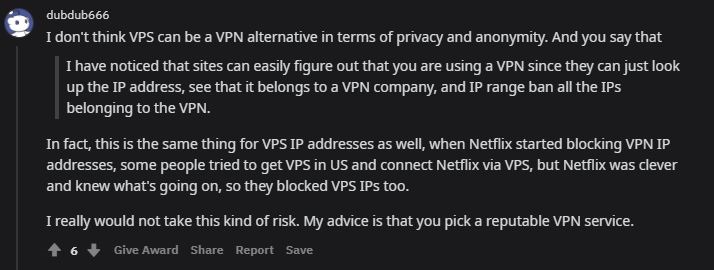A Virtual Private Server (VPS) is a hosting service that allows you to host your website on a virtual server environment. In contrast, a Virtual Private Network (VPN) is a user-oriented security tool that encrypts your internet traffic so that you can browse the web safely, anonymously, and securely.
It is prevalent to get both of them mixed up as their acronyms are similar. However, they each represent a completely different type of service. To make sure you choose the right service for your business or personal user, it is important to understand what VPNs and VPNs do, how they make it, and the difference between them.
Fortunately, we can help. In the following VPS vs. VPN article, we’ll explain these services’ similarities and differences so you can choose the service that best suits your needs.
If you have already decided to require a VPN service for your need, read Best VPN Services for 2022 – Fast, Reliable & Secure.
Virtual Private Server Hosting – What is it?
A VPS is a form of web hosting that a hosting company offers. It provides a virtual server environment to host your website. Think of this server as a computer that is storing website files and data. Whenever you try to access a domain via browser, the browser communicates with this computer (server) and executes all of the stored site files.
There are different web hosting firms, including dedicated hosting, shared hosting, managed hosting, WordPress VPS hosting, cloud hosting, and more. VPS hosting split a single physical server into multiple different servers. It is done so that you can have greater access to server resources.
Unlike physical servers, there aren’t many restraints over a virtual server. There won’t be any server resource sharing and also overlapping of server usage.
How does it work?
A VPS server uses similar technology used by VMware software and creates a virtual server environment. For instance, if you have a dedicated server, you can create several virtual servers on top of it, acting as their own dedicated server environment.
A VPS server will be built upon multiple different dedicated servers. So that if any one of them goes offline or goes under routine maintenance, it won’t affect the performance of your website. Each VPS server is completely separated and private from any other virtual server using the same physical server.
Advantages of VPS hosting
Internet users looking for something more than a shared server but aren’t quite ready for a dedicated server as well, VPS might be the solid choice for them.
Here are some of the benefits of using VPS hosting:
- As with VPNs, you’d have access to a dedicated server without the cost of a physical dedicated server. This makes it one of the best cost-effective solutions for hosting.
- You will customize your own server and add features that you require to run your websites.
- VPS allows you to slowly expand the number of server resources you have access to. You will also not have to pay for server resources you don’t need.
- In comparison to shared hosting, you’ll get a higher level of access to your server, including root access and the ability to run server scripts.
- You will receive technical support from the hosting service staff.
Disadvantages of VPS hosting
Nothing is perfect. With all its advantages, VPS still has some disadvantages you’ll want to be aware of.
Here are the biggest drawbacks to VPS hosting:
- VPS is expensive than shared hosting. Although it is not as expensive as dedicated hosting, you will be paying a higher monthly rate.
- Resource allocation issues are quite common in VPS. If another website running a VPS uses too large a volume of physical server resources, then your site performance may slow down.
When Should you use VPS Hosting?
When your website has outgrown the limits of the shared hosting plan, the next step is VPS hosting.
So, what is VPS hosting used for? Take a look at the situations below:
- If you are experiencing higher volume traffic, then a hosting plan that can keep up with your requirement is necessary. VPS hosting is scalable and can easily support a high number of traffic.
- When you are looking for more control over your server environment, you’ll get root access, OS of your choice, and other customizations with VPS.
- With a VPS, you can scale your server resources and expand your resource requirements as well.
Virtual Private Network – What is it?
A VPN is an encrypted tunnel over the internet to connect users to their destination securely and anonymously. Since a VPN requires an active internet connection to work, it typically keeps the connections private by encrypting them with various encryption tools and protocols such as AES-256-Bit military-grade encryption and OpenVPN/IPsec.
For example, any data sent from one office to another cannot be read by the government, ISP, or any other third-party outsider, even though it gets intercepted somehow. This is one of the main advantages of a virtual private network.
For in-depth knowledge about Virtual Private Network, I suggest you read: What is a VPN?
How does it work?
Once you launch your VPN software and connect to any of the VPN servers, it will automatically encrypt your internet data. Meaning, any data passing over your network connection will first pass through the VPN, get encrypted, and then travel to the destination. Everyone on the internet will see the transmitted data originating from the VPN server, not your home network.
When you enable the VPN, your internet traffic goes directly from your ISP to the VPN server. Then the data is encrypted and passed on to the destination. This helps to decrease a lot of the most common security risks you’ll run into online.
Even if any third-party entity intercepts your data, they can not read your information as it will be encrypted with military-grade encryption. It is the same encryption that the Government of the United States uses.
Advantages of VPN
Using a VPN is not only about securing your online privacy, but it is much more than that.
Here are some of the biggest advantages of using VPN:
- A VPN will allow you to bypass any form of geo-restriction. It will help you access different types of geo-restricted content from all around the globe.
- The essential function of a VPN is to protect your online data by encrypting it. No one will be able to read your data even if they intercept it somehow.
- You can bypass ISP throttling and torrenting restrictions with a VPN network.
Unblock streaming, throttling, and torrenting with these VPNs:
Best VPNs for Streaming in 2022
Disadvantages of VPN
While using a VPN is the most effective way to protect your online privacy and security, it still has some drawbacks.
Here are some of the most common drawbacks you’ll experience when using a VPN:
- With multiple layers of encryption added to the tunnel, you likely face slow-speed issues. Therefore, if you already have a slower internet connection, then you might want to think twice about connecting a VPN over it.
- No VPN is perfect. Even with the additional layers of encryption, your actual location and IP may get exposed due to a DNS or IP leak issue.
- VPN connections can drop due to different network parameters. If a disconnection occurs, you may lose existing anonymity until you reconnect the VPN.
When Should you use a VPN?
Reasons for using a VPN are not limited to just protecting your online privacy. There are multiple different reasons for using a VPN in your daily life.
Basically, if any of the following circumstances sound like you, then consider using a quality VPN:
- Accessing geo-restricted content that is not available in your country. By changing your IP address with the help of a VPN, you can access different types of streaming content and websites that were initially blocked in your region.
- IF you wish to secure your online data and network connection with military-grade encryption, using a quality VPN is your only choice.
- If you wish to remain anonymous online while getting involved in downloading torrents or bypassing ISP throttling.
- If you regularly use unprotected Wi-Fi networks such as Airport Wi-Fi and Coffee shop networks and wish to protect your online privacy and identity from being stolen by hackers, then you need assistance with a quality VPN.
VPS vs. VPN: Which one is right for you?
If you are looking for a server to host your website, then using a VPS would be an appropriate option for you. It offers the collective benefits of dedicated and shared servers to support your business’s online activity.
While VPS may be the best option for hosting a website or remotely running a complex application, most general internet users probably won’t need a VPS to securely browse the internet, access geo-restricted content, and enhance their torrenting and gaming experience.
If you are looking to enhance your online privacy and data security while enjoying unlimited and unrestricted access to geo-restricted content, avoid ISP throttling, and download torrents, then you should consider using a VPN.
Typically, while VPS server hosting is a somewhat specific service that is very beneficial in a few particular circumstances, VPNs are useful for just about everyone who goes online. If you’re interested in trying a VPN, we recommend ExpressVPN – it’s safe, secure, fast, and offers exceptional functionality.
VPS vs. VPN: What Reddit has to say?
We decided to dip into the sea of Reddit and see what Reddit users have to say about VPS vs. VPN.
Reddit user “dubdub666” in response to a question posted about VPN and geo-restricted websites, reassures that using a VPN is better for privacy, anonymity and accessing geo-blocked streaming content over the internet.
Reddit user “ballena8892” in response to a question, suggests that while purchasing a VPS is much cheaper than a VPN; it surely requires more effort and Linux knowledge for configuring a VPS.
Reddit user “3WcWUFULrV85” in response to a question reiterates the security issues within a VPS and suggests using a reputable VPN provider that is the safest option right now. 
After surfing through the seas of Reddit comments, I found that many of the users are preferring VPN over VPS simply because they are easy to configure, operate and require less technical knowledge.
FAQ
Let’s see some frequently asked questions.
Can I use my VPS as a VPN?
Yes, you can provision a VPS (Virtual Private Server) for a meager price and configure it as a VPN to secure your internet traffic, obtain complete anonymity, access geo-restricted content, overcome ISP throttling, and download torrents.
What is a VPS used for?
A Virtual Private Server is utilized for hosting. It virtually imitates dedicated server environments within a shared server. VPS hosting has become a popular choice because it is generally lower in cost than dedicated hosting but provides better reliability, security, and performance than shared hosting.
Final Thoughts
Hopefully, you will now have a greater perception of how VPS hosting and VPNs work, along with the unique purposes they serve. VPS vs.VPN debate has been going around for ages and will continue to. Whether you wish to secure your internet traffic, online identity, or privacy, access geo-restricted content, or bypass any restriction set up by the ISP, a VPN has proved itself to be a more friendly and easy-to-use companion.



